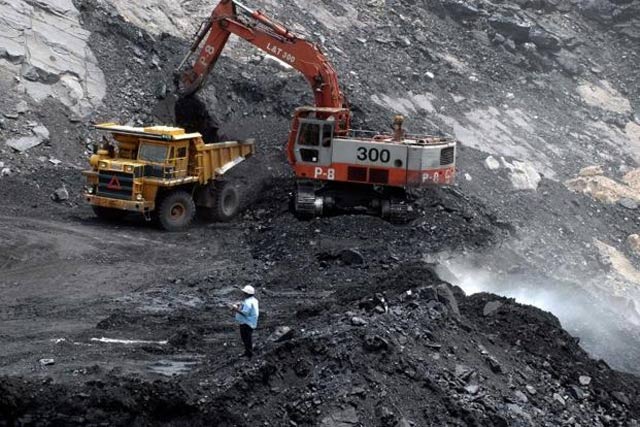
Pakistan is set to build a coal transshipment project at berth number 3 and 4 of Port Qasim that will be used to transport the fuel for two, 660MW coal-fired power plants in Sahiwal. The project is part of the multi-billion dollar China-Pakistan Economic Corridor (CPEC) and forms part of the PML-N promise that it would end load-shedding before the next general elections.
World moves away, Pakistan goes towards coal
However, the industrialists’ objection is not aimed at discouraging the government from taking steps towards an energy-sufficient Pakistan. Their argument stems from the worry that their exports may be threatened due to the dispersion of coal dust in the surrounding areas.
“There are many sensitive industries in the vicinity of the proposed project and we are concerned that the output of these factories would be damaged due to coal dispersion,” spokesperson of Bin Qasim Association of Trade and Industry (BQATI) told The Express Tribune.
The coal jetty, which envisages transporting thousands of tons of
coal north of the country, is surrounded by industries including pharmaceutical, edible oil, food and a water filtration plant among others. There are currently 180 large- and medium-size industrial units operating in the industrial area at Port Qasim, Pakistan’s second busiest port that handles about 40% of its seaborne trade.
Factory owners are worried about escalation as well. They fear that this may just be the start of a gradual move towards many such coal-powered projects at the port. Since the country’s electricity demand is growing fast, the government may encourage more investment in other coal transshipment projects, which would hurt the businesses of surrounding industries.
Thar Coal project faces prospect of delay
Environmentalists believe the project will cause more harm than good, given the country’s history of weak enforcement and monitoring incapability.
“The project is going to badly affect the natural environment. The Sindh Environment Protection Agency (SEPA) should work in the interest of people and not those who destroy the environment,” said Roland deSouza, executive member Shahri, a Karachi-based NGO that works for environment protection.
He said that SEPA does not have the required workforce to monitor such a huge project. “The agency is likely to approve it and, like the other projects it has approved in the last decade, this one will too, end up destroying the environment.”
The other side
Proponents say that it is still possible to control the dispersion of coal dust by spraying water and other binding agents at the coal import facility. Their arguments are based on regular monitoring as the project moves forward. However, detractors maintain such mitigation measures would not be enough.
“We fear the project would hurt our exports. Due to the sensitive nature of our products, we cannot afford a coal jetty within a kilometre’s radius of our factory as it will affect the quality of our medicines,” a top official of a pharmaceutical company told The Express Tribune.
Pakistan, China ink agreement for coal project
There are also some automobile industries in the area that are concerned about the air-mix, which is crucial to their operations.
“I think we will have to move our industry somewhere else if this project is built at the proposed location. We produce highly sensitive auto parts that cannot be produced in the presence of air that is polluted with coal particles,” a representative of an auto parts making company commented on condition of anonymity.
Another business owner echoed a similar view.
“We produce food products. We believe it will not be humanly possible for us to protect our machinery and our products from the dispersion of small coal particles,” said an official of a multinational food company that is located within a kilometre or so of the proposed coal jetty.
On the other end is SEPA Director General Naeem Ahmed Mughal.
He says that his office would ensure the project meets all environment protection measures during and after completion of the project.
However, Mughal, who presided over a recent public hearing organised at a local hotel, said that the project is very important for the country’s economy.
He tried to convince environmentalists, industrialists, social workers by saying that he would not approve the project at the cost of the environment.
“There are coal import facilities even in residential areas in leading industrialised countries. We can protect our environment without compromising our economic interests,” he told participants towards the end of the public hearing.
His argument did not entirely convince the gathering that left with one simple thought — would he be okay with having his house in the vicinity?
Published in The Express Tribune, October 10th, 2016.


1729662874-0/One-Direction-(1)1729662874-0-165x106.webp)



1726722687-0/Express-Tribune-Web-(9)1726722687-0-270x192.webp)

1732103737-0/Copy-of-Untitled-(55)1732103737-0-270x192.webp)








COMMENTS
Comments are moderated and generally will be posted if they are on-topic and not abusive.
For more information, please see our Comments FAQ